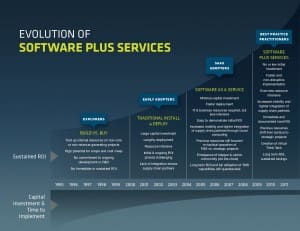Software-as-a-Service (SaaS) is an integral part of advanced transportation management systems (TMS) and is largely viewed as providing the greatest time to value (see recent posting by Adrian Gonzalez of ARC Advisory Group titled, “Time-to-Value: Developing a SaaS Equivalent for 3PLs”). But as often happens when an innovative technology becomes widely adopted, users’ expectations rise a notch, opening the way for further refinements (see diagram below). In this case, the next step forward is software plus services; a combination of SaaS and dedicated support teams that is designed to meet the changing needs of transportation managers.

There are two main drivers behind the emergence of software plus services. First, a number of companies have discovered that after investing in SaaS-based TMS and reaping initial savings, ongoing returns have proved elusive. Adding services to this core functionality has enabled these organizations to unlock an ROI beyond this honeymoon period.
Second, managers are under considerable pressure to do more with less, particularly when it comes to departmental headcount. They must find ways to use staff resources more effectively while maintaining a competitive edge. SaaS technology helps in that it brings more flexibility both in overall cost and operational terms than traditional software solutions. However, running these powerful TMS packages require skilled personnel, individuals that might be better deployed on more strategic functions. The solution a number of companies have developed is to outsource much of the tactical TMS work to specialist service teams, while reserving strategic responsibilities, such as large-scale or strategic project management and supplier or relationship management, for their own personnel.
It is important to note that the “service” element of the software plus services model is far removed from traditional outsourcing to a 3PL. In the new model, companies need a high level of external expertise that is readily accessible and can be deployed to fit the specific demands of the transportation function. These needs are being met by dedicated teams employed by a TMS provider often stationed permanently on-site, acting as an extension of the client’s staff. Moreover, as with the traditional SaaS mode, both the dedicated personnel and the technology are positioned in a pay-as-you-go model. This allows a shipper to free up working capital and move a traditional fixed personnel cost to a variable that flexes up and down with the overall performance of the business. The concept differs from traditional consulting because these individuals do not walk away when the job is done; they are, in effect, quasi-employees of the client firm that act as an extension of the shipper’s staff. Neither are they temp staff because the relationship is ongoing and team members represent the client firm in various capacities. For example, they provide routine analyses and expert advice in customer meetings.
Take the experience of canned and bottled juice maker Ocean Spray. A transportation services provider managed the manufacturer’s carrier relationships. The provider worked remotely from its home office location and had little face-to-face interaction with Ocean Spray’s operations, customer service or supply chain teams. Service quality suffered by allowing the provider to choose carriers, negotiate contracts and monitor scorecards, because the manufacturer was a step away from its customer base.
Ocean Spray also piloted an in-house TMS solution. Although this proved to be an effective tool for managing transportation, there were too many drawbacks. The initial purchase price was considerable, and when Ocean Spray added up the ongoing maintenance fees the company simply could not make the ROI model work.
Now the company has a dedicated TMS team based permanently in its corporate offices. The unit consists of a strategic account manager, an operations manager, four operations and logistics analysts, and two dedicated schedulers/customer service representatives. Team members report directly to both the manager and director of transportation at Ocean Spray. In addition to providing ad hoc analytical information and regular network performance reports, the team is available for impromptu meetings to discuss transportation strategy and tactics, and address specific issues. However, Ocean Spray’s transportation managers retain oversight of carrier selection and management, and have full control of the strategic levers.
Having an on-site team at the shipper’s disposal is only one variant of the software plus services model. Other companies have opted for different formats. Here are some examples.
- A manufacturer of heavy equipment with an extensive network of factories and dealer sites has a dedicated TMS team that resides in the provider’s HQ. A team member is based in the manufacturer’s office location as a project manager.
- A medium-sized manufacturer of food products decided on a hybrid model where a TMS project manager is rotated through the launch phases of products. For example, the manager was embedded at a plant level during the early stages of a launch to help oversee activities such as carrier integration.
- A medium-sized packaging firm has opted for a single specialist embedded in its organization. The person rotates between the firm’s corporate offices, plants and warehouses.
Software plus services is not for every organization. Companies that need to micro-manage transportation or are committed to a sophisticated in-house TMS are among those that might not be comfortable with a dedicated team from a service provider.
Still, the demands that spawned this solution –clear returns on IT investments over the long term and improved staff utilization – will, if anything, intensify over the next few years, and more companies are likely to take this next step in SaaS-based TMS.
Jordan Kass serves as the Executive Director for TMC, C.H. Robinson’s Managed TMS service that includes Six Sigma-based process engineering, TMS technology, and power users to ensure maximum software ROI. Jordan is a recognized thought leader, with sixteen years of industry experience. TMC is a global division of C.H. Robinson Worldwide, Inc.


















Leave a Reply